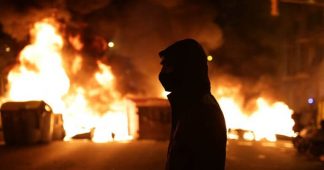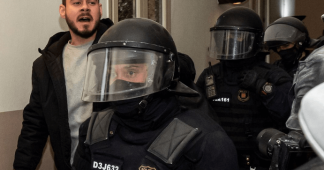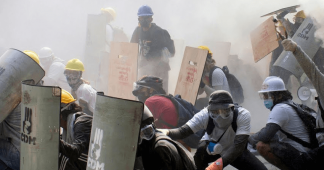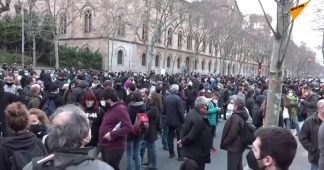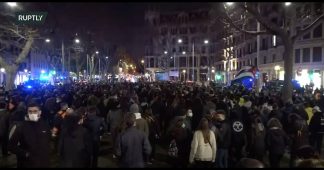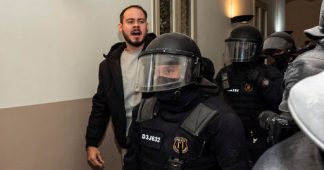AN EU committee’s recommendation that former Catalonia president Carles Puigdemont and two colleagues be stripped of immunity is no joke. Fellow politicians of the administration he led, which held an unconstitutional independence referendum in 2017, have been punished in Spanish courts with prison terms of up to 13 years.
It also stands in stark contrast to the case of Giannis Lagos, a neonazi elected on behalf of Greece’s now banned Golden Dawn, who has also been sentenced to 13 years in jail — for crimes including orchestrating the murder of rapper Pavlos Fyssas — but who currently retains his immunity as an MEP.
Hypocrisy is nothing new for the EU, and if the bloc’s silence over the arrest of hundreds of protesters supporting jailed Spanish rapper Pablo Hasel sits uncomfortably with its condemnation of the similar crackdown on demonstrators for the release of Alexei Navalny in Russia, the inconsistency won’t give Brussels power-brokers sleepless nights.
What might is the way unrest in Spain is opening up serious debate about the structure of the Spanish state.
Reports from the Hasel protests — he was sentenced to nine months for lyrics found to have glorified terrorists, and fined tens of thousands of Euros for insulting the monarchy — say the issue goes deeper than freedom of speech, and is linked to economic problems including the EU’s highest unemployment rate.
Socialists might put it the other way round. Economic pain — in Spain inseparable from the conditions attached to an EU bank bailout after the financial crash, involving tens of billions in public spending cuts — is the context in which people look to understand deeper-rooted problems in the way society is structured.
The scandals that have rocked the royal family — the former king Juan Carlos has now fled to the United Arab Emirates amid a corruption probe — have focused attention on the incomplete “transition to democracy” that followed fascist dictator Franco’s death. Crowds are targeting the royals as well as the Public Security Law that jailed Hasel, chanting “Juan Carlos de Borbon, womaniser and thief.”
Government ministers distance themselves from the repressive actions of the judiciary. Consumer Affairs Minister Alberto Garzon of the Communist Party — part of the United Left, which together with Podemos forms Unidas Podemos, the junior partner in the Socialist Party-led coalition government — has condemned Hasel’s sentence as “a serious democratic anomaly” and warns that freedom of expression is under threat with increasingly frequent prosecutions.
The coalition is committed to reforming the law. But stresses within it are acute. The Hasel case is just one bone of contention.
Differences over equalities legislation, especially gender self-identification, have led them to break ranks in parliament. The row has become vicious, with activists hanging Deputy Prime Minister Carmen Calvo in effigy because of her opposition to self-ID.
As in so many other Western countries, Spain’s ruling class faces a crisis of legitimacy.
Its repeatedly deadlocked parliaments show a political polarisation familiar in Britain from much of the last decade. Its coalition government seeks dialogue with separatists and protesters, while its permanent state metes out some of the harshest repression in Europe.
By comparison with much of the continent, the Spanish left is doing well: it is in office and promoting a number of progressive reforms in the context of a radicalising populace.
But it faces an increasingly radical right, one seizing on concessions to Catalan independence supporters or republicans as evidence of treachery to Spain. An inability to engage in respectful debate on points of disagreement is proving dangerously divisive, as it has in other countries, at a time when left unity is essential.
Garzon’s defence of freedom of speech is a good starting point. Hasel’s prison sentence should be condemned however offensive some people find his lyrics. Likewise, solidarity should be extended to Catalan politicians threatened with or already in jail simply for holding a referendum, whatever one’s views on Catalan independence.
Published at morningstaronline.co.uk
Also read
“We don’t live in the Dark Ages!” Α new Greek crisis
